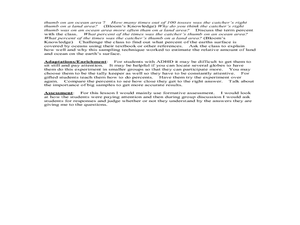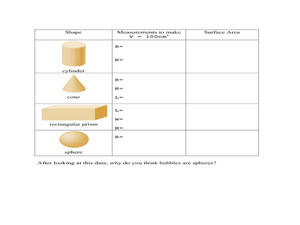Carnegie Mellon University
Marcellus Shale: Who Pays?
After viewing short clips of unfortunate events, your class will consider two sides of a homeowner's court case, and then learn about the Marcellus shale deposit beneath the state of Pennsylvania and the hydraulic fracturing process. In...
Curated OER
What Part of the Earth's Surface is Covered by Oceans?
Third graders investigate oceans. In this Earth science lesson, 3rd graders predict how much of the Earth's surface is covered by oceans. Students determine if their predictions are accurate by throwing a globe to each other and then...
Curated OER
LRO-Searching for Lunar Boulders
In this lunar boulders worksheet, students use an image taken by the LRO satellite of the surface of the moon to find the scale of the image and determine the number of boulders and their approximate sizes.
Curated OER
LRO and the Apollo-11 Landing Site
In this Apollo-11 landing site activity, learners read about the NASA Lunar Reconnaissance Orbiter (LRO) that will collect images at a higher resolution than ever before. Students study a grid showing the lunar landing site from Apollo...
Curated OER
Seismic Waves
Students identify the four types of seismic waves, their characteristics and effects. Then they predict the level of damage each wave might cause in a residential area and test their predictions against several computer animations. ...
Curated OER
Tangents, Secants, and Chords
For this tangents, secants and chords worksheet, 10th graders identify and solve 48 different problems that include using 3 different theorems for defining circles. First, they determine the area of each circle with C as the center and a...
Curated OER
Sunspots
In this sunspots worksheet, students use the given size of a sunspot and find the total number of Earth's it would take to equal the sunspot size. Students answer 3 questions about the sunspots and are given an extra credit problem with...
Curated OER
Playground Measurement
Fifth graders find a rectangular or square object in the classroom to measure. They measure to the nearest centimeter and apply that knowledge to measuring perimeter. They recognize, describe, and determine surface area and volume of...
Curated OER
Review of Triangles
Students investigate the Pythagorean Theorem. In this geometry lesson, students define angles and sides of right triangles. They calculate the area and surface area using formulas derived by the Pythagorean Theorem.
Curated OER
Searching for Meanings Beneath the Surface of the Poem
Young scholars analyze poetry. For this cultural perspectives lesson, students read the poem "Soccer Until Dusk" by Mark Brazaitis. Young scholars analyze the poem and consider the cultural perspective it reveals.
Curated OER
Rectangular Prisms [J]
In this rectangular prism worksheet, students find the volume and surface area of 3 rectangular prisms. Answers are included on page 2.
Center Science Education
Feeling the Heat
What is an urban heat island? Middle school meteorologists find out by comparing temperatures at different locations on campus. They relate their findings to what might be happening in a concrete jungle and how it impacts local weather....
University of Rhode Island
Food Safety Smart Curriculum
This is a must-have resource with everything you'll need for studying food safety with your pupils. From handwashing scorecards and cleaning kitchen surfaces to navigating the world of microbes and food-borne illnesses, here you'll...
Alabama Learning Exchange
Pennies, Pennies and More Pennies
Learners determine the number of pennies needed to fill a room. For this pennies lesson plan, students work in groups to determine the number of pennies needed to fill a room. They compute the probability of the head of a pin landing...
Curated OER
Science: Lead Shot and Waterfowl
Students examine data to investigate the impact of lead shot pellets on waterfowl populations. They graph their findings and discover how lead in ingested by birds and poisons them. As an extension, students research legislation and...
Curated OER
Winter-time Temps
Students measure temperature and become aware the the temperature above and below the snow is different. In this winter temperature lesson, students measure temperatures to find variation based on how the snow is packed. Students create...
Mathematics Vision Project
Module 5: Modeling with Geometry
Solids come in many shapes and sizes. Using geometry, scholars create two-dimensional cross-sections of various three-dimensional objects. They develop the lesson further by finding the volume of solids. The module then shifts to finding...
Balanced Assessment
Bumpy-Ness
Develop a new measure of the properties of an object. Scholars develop a definition and formula to measure the bumpy-ness of an object. They utilize their formulas to find the property for several spherical objects.
Charleston School District
Applications of the Pythagorean Theorem
Use patterns to your advantage! The Pythagorean Theorem allows learners to find missing sides of right triangles. Problems include those with both rational and irrational lengths.
Curated OER
Why are Bubbles Spheres
Students calculate the surface area of different polygons. In this geometry lesson, students practice calculating the volume of spheres. They work with cones, cylinders and rectangular prisms.
Noyce Foundation
Which is Bigger?
To take the longest path, go around—or was that go over? Class members measure scale drawings of a cylindrical vase to find the height and diameter. They calculate the actual height and circumference and determine which is larger.
Curated OER
Squares
In this squares worksheet, 10th graders solve and complete 7 various types of problems. First, they divide a product of one with a square of the other. Then, students find the dimensions of a rectangle that will maximize the area. In...
Curated OER
Rectangular Prisms [G]
In this rectangular prism worksheet, students find the volume and surface area of 3 rectangular prisms; answers are included on page 2.
Curated OER
A Sphere and Its Net
Students identify and sketch the nets for sphere. In this geometry activity, students differentiate between two and three dimensional shapes. They find the surface area of each sphere.












![Rectangular Prisms [J] Worksheet Rectangular Prisms [J] Worksheet](http://content.lessonplanet.com/resources/thumbnails/217704/large/nziymdg3lmpwzw.jpg?1414307543)











![Rectangular Prisms [G] Worksheet Rectangular Prisms [G] Worksheet](http://content.lessonplanet.com/resources/thumbnails/217114/large/cgrmlwnvbnzlcnqymdezmdmzms05otctmwzhc2d0yy5qcgc.jpg?1414307139)
